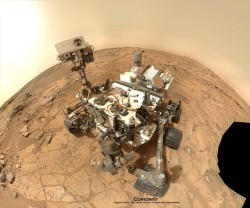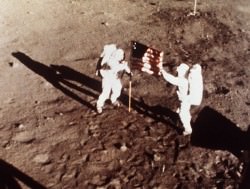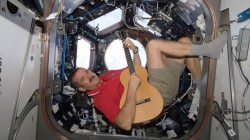You might be surprised to know that I have an opinion. People often ask me for it, but tend not to give it. But I was getting into a discussion with Amy Shira Teitel from Vintage Space about the priorities of humans versus robots for space explorations and offered up this opinion.
On matters of humans versus robots exploring space, this is what I think. Both, with different agendas.
Opinion: Should Robots or Humans Explore Space?
What’s the best way to explore the Solar System? Should we send humans, or robots? Robots are durable and replaceable, while humans are creative and flexible.
Space advocates line up on both sides of this discussion, and the debate can get heated.
Really heated.
Don’t be fooled. This whole conversation is a red herring.
We shouldn’t have to choose between human space exploration and robotic science, and it is absolutely ridiculous that the funding for it comes into a single agency.
The future of humanity will depend on us learning to live in space; to get off this planet and spread to the rest of the Solar System. The longer we remain trapped on this planet, the greater risk we face from a global catastrophe; whether it’s from an asteroid strike or a global plague.
We, as a species, are keeping all our eggs in one basket,
I don’t need to tell you how important science is. Our modern marvels are a direct result of the scientific method. The fact that you can even see this video (well, or read this article) should be all you need to know about the importance of science.
And we have no idea what we’ll find out there in space when we go exploring.
Were it up to me, I’d separate space exploration into two agencies, with completely different agendas and budgets.
On the science side, we need a fleet of robotic spacecraft and satellites continuously launching into space. We’d settle on a rugged, multi-purpose vehicle, which carries a variety of payloads and scientific instruments.

Let’s send a rover and an orbiter every two years to Mars, and similar probes to other worlds, only the scientific instruments would need change. In a few years, there would be versions of the exact same spacecraft orbiting planets, asteroids and moons.
Over time, our observation of the Solar System would extend outward like a nervous system, gathering scientific knowledge at a terrific rate.

Remember the Gemini program back in the 1960s? Each mission was an incremental step more complicated than the previous one. On one mission, the goal was just to learn if humans could survive in space for 14 days. In another mission, the goal was just to learn how to dock two spacecraft together.
This gave NASA the knowledge they needed to attempt an ambitious human landing on the Moon.

In this modern era of budget cuts, it breaks my heart that people are forced to choose between space science and human exploration.
It shouldn’t be this way. They have almost nothing in common.
Let’s do science, because science is important.
And let’s put humans in space, because humanity is important.


A robot would be the best option being that it wouldn’t really matter if we lost it in space or something like that but loosing a human in space is another thing.
I’ll let Captain Kirk answer that… http://www.youtube.com/watch?v=4ErkeFA-QWk 🙂
This is an excellent question and great analysis.
How about diverting most of the war and science funds into R&D of clean, efficient and portable energy sources. Then I guess things should be much easier for space exploration, and everything else.
You can’t predict exactly what science that will net ROI, but we can predict that it is all interrelated and that science at large is among the best ROI opportunities out there (see NASA’s research on that). Hence you can divert “science funds” and expect good R&D results. If you try, you will never get “clean, efficient and portable energy sources”.
As for energy sources, we already know what we have access to: solar energy (directly or indirectly as fossil energy) and “nuclear” energy (radioactivity, fission, fusion). We can’t shrink them much more than we already have, nor improve efficiency much. (With the exception of photocells of various kinds.)
We can do a lot more on improving efficiency of consumers. Modern refrigerators and cars beats the old ones many times over.
I maintain that this peer reviewed research on the ROI for exploration with humans and robots is due diligence in such a discussion. It shows that, given that you can afford the massive investment, human exploration is many orders of magnitude less costly than the rover robotics suggested here. E.g. you will speed research that much.
And seeing the concernt for life raised in earlier comments, the cost for a reasonable low risk exploration is folded into those numbers.
But this is separate from what strategy should be explored, especially if you decide to waste money on sub-optimal investments. A mixed strategy could maintain tax payer interest better, but I’m not aware on any research exploring that. Even better ROI could be to support the burgeoning space tourism.
With the current economical strategy that democracy is optimized for, e.g. subotptimal investments, I would suggest investing in rovers and space tourism.
If one can get the tax base to become more interested, I would suggest dumping the rovers and put as much as possible into manned exploration. It would be cheaper and accelerate science return enormously.
Robot should do the boring things. Like exploring asteroids and bring back samples.
Humans should put bases on the Moon and Mars.
But if you put robots on ‘steroids … we are DOOMED!
Robots don’t bunny hup on the moon they are not that cool.
But my first priority is to put a robotic web cam in the moon and let the public steer the robot just like they can steer certain web cameras on Earth.
Second priority would be to send robotic landers on the moon that could become a moon basis and observe the lunar dust.
The manned mission to an asteroid is cool because they leave the safe return trip that the Apollo astronauts had when they went to the moon.
Just put the robots on A-Steroids and the problem is solved….
It is so strange I was thinking along the exact same lines earlier today.. and ended up with pretty much of the same conclusions – science can be left to robots, but still by astronauts too when convenient. To solely collect rock samples on Mars to take home is much less expensive done with robots. But to get people out from this world to learn to live elsewhere needs a wholy separate strategy and budget. Agree. Cheers!
Probes and robots perform certain experiments and observations based on a preset protocol. This holds whether the spacecraft is the PLANCK spacecraft measuring the CMB anisotropy or a rover on Mars. The range of action is limited, but it is well defined. Humans in space are flexible, but are largely not needed for most space science objectives. As such the purpose for robots is directed towards research, while with humans the ultimate intention involves political or economic objectives, or frankly just plain “adventure.” I would agree with Fraser that the question over whether robots or humans are needed in space is not appropriate, for the two seek different objectives.
The question concerning probes and robots is pretty clear, for they have been very successful at acquiring scientific data. The question over whether humans should go into space is then whether the political and economic intended objectives are cost effective and of value. That question is enormously complicated and difficult.
LC
I agree that question is complicated and difficult, and on the side advocating human space travel, the notion of success appears to be derived in a large part from the hopeful thinking that technology can be developed to overcome the dinosaurs in the living room. For example, the extremely prohibitive issues that zero gravity presents for long distance human space travelers.
I agree with Fraser Cain’s reasons for supporting human space travel; but realistically, what are the chances that gravity will someday be duplicable in a space vehicle?
The only way to get artificial gravity is with a rotating frame. If something is rotating around a pivot point at a r with an angular frequency ? the centripetal acceleration is a = ?^2r so if the radius is 10m and we have an acceleration of 1gee = 10m/s^2 the angular acceleration has to be ? = sqrt(10/10)s^{-1} = 1s^{-1}, which means it would rotate every 6.3 seconds. There is a bit though with coriolis acceleration which occurs with the motion of a body in an accelerated frame. This is a_c = 2?xv (the x means cross product), which for the velocity perpendicular to the axis of rotation this is a_c = 2?v. For walking speed of about 1m/s this Coriolis acceleration is 2m/s. This is highly disruptive. Even if we make the radius 100m the angular acceleration is ? = .316s^{-1} and so the coriolis acceleration is .63m/s. This would still be noticeable, and it would be annoying and somewhat disorienting. Around 100m radius one is starting to get a reasonable artificial gravity system.
You have to have large rotating structures or two equal masses rotating on opposite ends of a boom or large truss type of structure where one of them is the habitat module. The scale becomes rather large.
LC
Space should not be explored at all. It should be colonized. And it should certainly not be colonized by robots as long as we humans are still in command of our civilization.
If we happen to explore space as a side-effect of colonizing it, then it is good so. But exploration is no end in itself. Exploration alone is a totally useless goal. It is only of any use if it is a step towards colonization.
i agree with our general point but uh space kinda has to be explored in order to be colonized.
“hay lets go live on Venus”
“great idea”
some time later
“OH GOD EVERYONE IS MELTING!!!”
“WHY DIDN’T WE EXPLORE THIS PLACE FIRST!!!”
Fantastic points my friend, this is exactly how it should be. Both are necessary, and they complement one another. As you say though, the ultimate goal is species survivability and getting out there to explore for ourselves. Robots are an important addition to our efforts, but if its not about human beings then it becomes routine and even boring for the vast majority of non-scientists. Few things seem to be able to unite us as a species more than landing our butts on another world. Its the idea that someday, somehow, you as a regular joe could do the same thing, thats what inspires people to support the space program.
Indeed, it shouldn’t be this way. But Frasier, unfortunately it is. Financial recources will be limited for a longe time to come. Therefore, we have to make choices. One of these choices could be raising taxes on behalf of an ambitous ans sustained manned and unmanned space program. Is America prepared to do this?
The answer to the above question is Yes.
And of course, this:
robots! send them to all planets in Sol! 😀